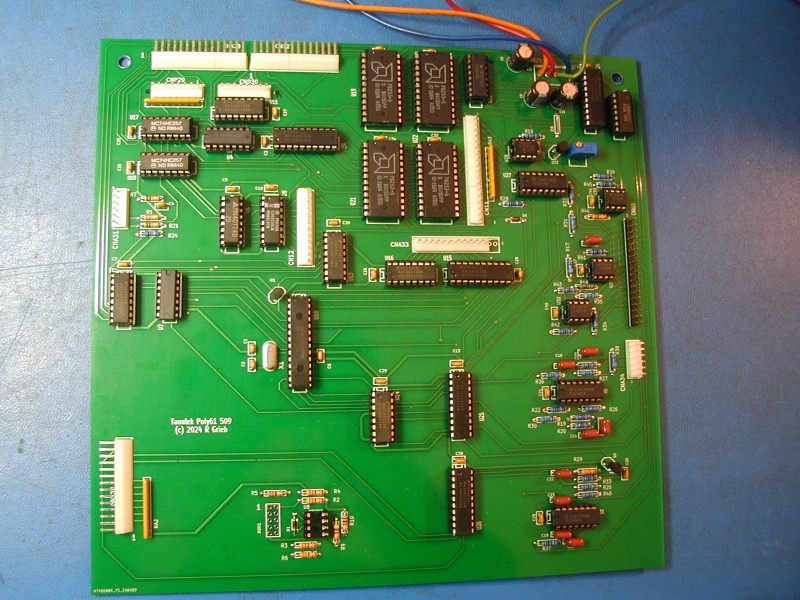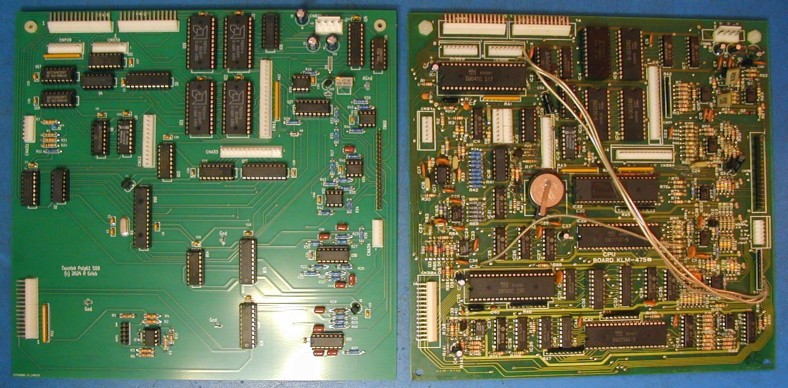KLM-475/509 replacement for the Korg Poly-61 Synthesizer (some assembly required)
Some years ago I started a project with the goal of increasing the resolution of control parameters in the Korg Poly-61. My initial approach was a daughterboard which plugged into the sockets of the two MCU chips on the digital board and generated control voltages for the voice board. While this approach may have worked out, I abandoned it as being too much effort for the final result. The main shortcoming of this approach was that it did not address existing damage from battery leakage on the digital board, which is fairly common. Recently I decided to make another attempt at a Poly-61 project, but this time the plan was to replace the entire KLM-475/509 with a new design which would increase the resolution of the parameters and also add MIDI. It seemed that a single PIC microcontroller would have enough processing power to replace both of the old MCU's. I chose a 12-bit DAC to generate all of the control voltages, with a CD4051B de-multiplexer feeding eight sample and hold circuits. I decided to implement the LFO in firmware so that additional waveforms could be provided. Initially, I had hoped to use PIC chips to replace the 8253 timers, but ended up scrapping that idea. Luckily, it is still possible to buy 8253 chips, and using them simplified the project. Below is a photo of the first version of the pcb. (the MIDI cable is not attached but you can see where the 10-pin connector goes. On this board, a single row header was installed instead of the flex connector, as the original flex cable was ruined by battery leakage corrosion and had to be replaced with a different type) The design is simpler than the original and takes up less pcb space, since there are no 40-pin DIP IC's. It should also draw significantly less current at 5V, although I have not measured this. The cassette in and out circuitry has been removed, since MIDI sysex can be used instead. I placed the JST connectors in the same positions on the pcb to ease installation. I am currently using the v2 pcb for firmware development, which has a few small changes.

Here is a photo showing the new pcb and the Korg KLM-475B. (The KLM-509 is very similar to the 475B)

I am currently working on finishing and testing the new firmware. Here are some of the features which have already been implemented:
1) 0-99 settings for cutoff,resonance,attack,decay,sustain, and release
2) 0-63 settings for PW/PWM
3) 0-15 settings for LFO1 to DCO and VCF amount
4) 0-41 settings for LFO1 frequency
5) LFO1 waveforms: triangle,ramp up,ramp dn,square,random
6) LFO1 delay settings 0-7
7) DCO2 Interval settings of 0-12
8) LFO2 (for PWM or optionally DCO freq) freq setting 0-31
9) LFO2 waveforms: triangle,ramp up,ramp dn,square
10) DCO freq mod can be either LFO1 or LFO2
11) Random arpeggiator mode
12) MIDI In supports Note On/Off, program change, CC parameter control
13) MIDI channel can be 1-16, and is saved in EEPROM when power is off
14) Patch save and load via MIDI Sysex (all patches at once, not individual ones)
15) 80 patches are now implemented, saved in EEPROM (no battery needed)
16) Rotate or "always start from voice 1" key assign modes
17) DCO1 can now be disabled
18) DCO2 "extra waveforms" now usable
19) MIDI note out modes: Normal, Overflow, Alternating Rotate
20) MIDI out program change messages can be disabled
21) Arpeggiator can be clocked by MIDI.
In general, the range of the control voltages is the same as before, although the
LFO's can be set to a much lower freqeuency now.
The new firmware is offered on as-is basis:
The new firmware has been tested by four people so far, in six different synths. A few small bugs were found recently and have been fixed. I cannot guarantee that there are no more bugs in the code. I will attempt to address any issues that come up, but some things are simply too complicated to fix, or fundamental to the way the Poly61 works.
Once it's tested and "released", then what?
I will not be supplying assembled boards. This is a DIY project, for people who are comfortable with buying parts and soldering. I am supplying Gerber files which can be used to order pcbs (I have had good results with JLCPCB), a parts list, and the hex file for programming a PIC chip with the new firmware. Note: The hex file for the PIC chip does not contain any patches. After programming the chip, you must load the factory patch sysex (below), or create your own patches and save them. Most of the parts are available at Digikey and Mouser. The 8253 chips and the 18-pin flex connector are not.
Some files you will need:
Here is the BOM/parts list for the new board. Here is the CCmap and new features usage document. Here is info on wiring the MIDI jacks. Here is some info on how to do the initial power-up. Here is a list of some expected parameter voltages which help to confirm correct resistor installation. Here is a label for the front panel showing the new parameters.
New patch sysex files:
The patch format was changed to support the additional parameters and resolution. The Korg patches each occupied just 8 bytes. The new patches take up 12 bytes. I wrote a program to convert the old factory and test patches to the new format. Here is an archive containing the new factory patch sysex file, and also the new service patch one. Note that in the factory patch file, patches 81-88 are the same as 11-18 (as in the original Korg ones). New patches 91-98 and A1-A8 are all the same and are just copies of patch 88. To load the factory patches, you must turn off memory protect temporarily.